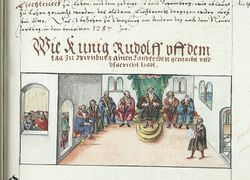Court day

As court day is called the formless and irregularly held meetings of the Roman-German king or emperor with selected greats of the Holy Roman Empire . Older research also referred to these meetings as Reichstag , although the meetings did not refer abstractly to the Reich, but specifically to the respective ruler.
history
As early as the High Middle Ages, the obligation under feudal law to stand by the king with advice and action was derived from the obligation to appear personally at court at the request of the king for deliberations and decisions; the so-called court duty. The farm days were scheduled for this. These farm days are named differently in sources. You can find names such as parlamentum , conventus , colloquium , curia , curia regis . All of these terms could be expanded with additions such as solemnis (German 'solemn') or magnus (German 'large') to make the meaning of the meeting clear. The only difference between the court days and normal court meetings is the presence of the invited people. These could be princes, nobles, clerical dignitaries or representatives of foreign powers. Since the 13th century, representatives of the imperial cities have also been invited to court days. The court days were also organized as part of the court keeping and strictly related to the king.
When the king held such court days and whom he invited to them was entirely at his discretion. It is therefore difficult to distinguish between the princes' legally relevant consent to a decision and advice. However, the duty to give advice to the king soon became the right of the princes to take part in important matters concerning the empire, e.g. B. the bid for the Imperial Army trip to be heard. In which matters the king sought advice and obtained the consent of the princes, however, seems to have largely been at the discretion of the king, so that there can be no question of an institutionalized co-rule of the princes.

High and late medieval documents, which contain important political decisions or dispositions of imperial property, emphasize that the decisions were made with the "council" and the "consent" of the princes. Both terms are used synonymously in these documents from the point of view of legal relevance. Those who were not invited by the princes or who were in opposition to the king did not feel bound by the resolutions of the court days.
After the interregnum in the 13th century, the role of the electors increased, since they only took on the role of the princes of the empire and gave their formal consent to royal dispositions of imperial property through so-called letters of will . But here, too, there is no recognizable obligation on the part of the king to obtain such letters of will in his dispositions.
As a result of the withdrawal of kingship to the respective hereditary lands at the end of the 14th century and the general weakness of it at the time of the Count-Kings , the days of the kingless , on which the greats of the empire conferred without the intervention of the king, became more and more important. Court days were rarely held. From these days without a king , the legal institution of the Reichstag developed at the end of the 15th century . The Reichstag in Worms (1495) in particular had a decisive influence on the development of the empire . The German King Maximilian I accepted the change from the institution of the court assembly to the Reichstag as an influential political instrument.
See also
literature
- Karl-Friedrich Krieger: King, Empire and Imperial Reform in the Late Middle Ages . 2nd revised edition. Oldenbourg, Munich 2005, ISBN 3-486-57670-4 ( Encyclopedia of German History 14).
- Malte Prietzel : The Holy Roman Empire in the late Middle Ages . Scientific Book Society, Darmstadt 2004, ISBN 3-534-15131-3 ( compact history - Middle Ages ).
- Gabriele Annas: Court Day - Common Day - Reichstag. Studies on the structural development of German imperial assemblies in the late Middle Ages (1349–1471) . 2 volumes. Vandenhoeck & Ruprecht, Göttingen 2004, ISBN 3-525-36061-4 ( Series of publications by the Historical Commission at the Bavarian Academy of Sciences 68), (At the same time: Cologne, Univ., Diss., 1997), (With CD-ROM: Directory visitors to German imperial assemblies in the late Middle Ages (1349 to 1471) ).